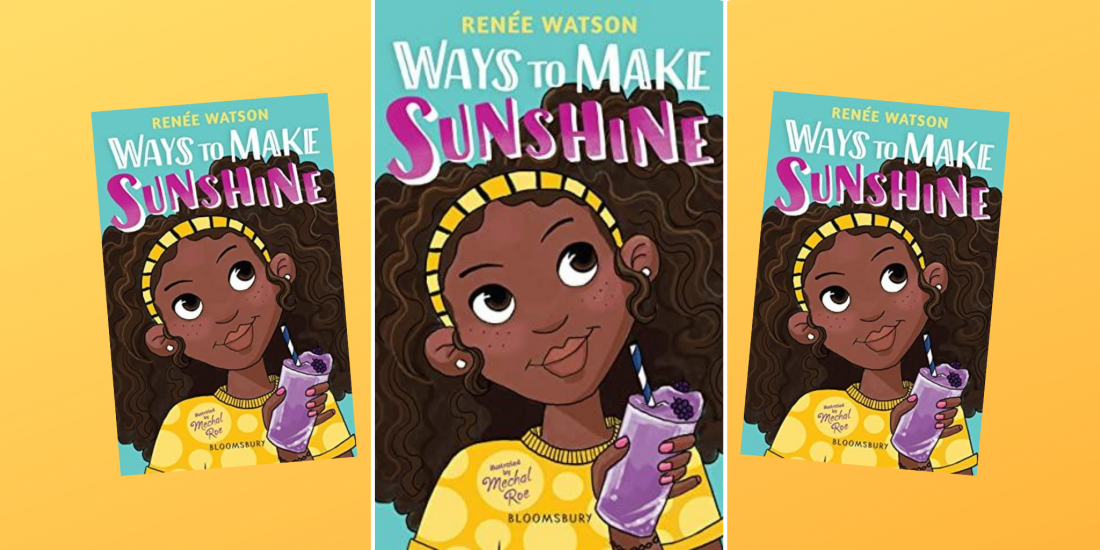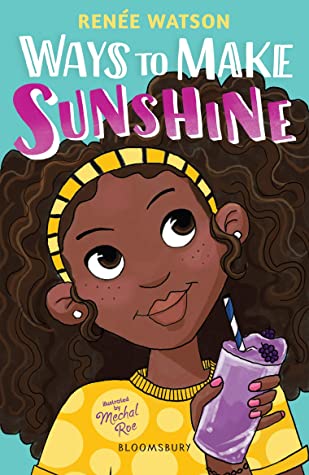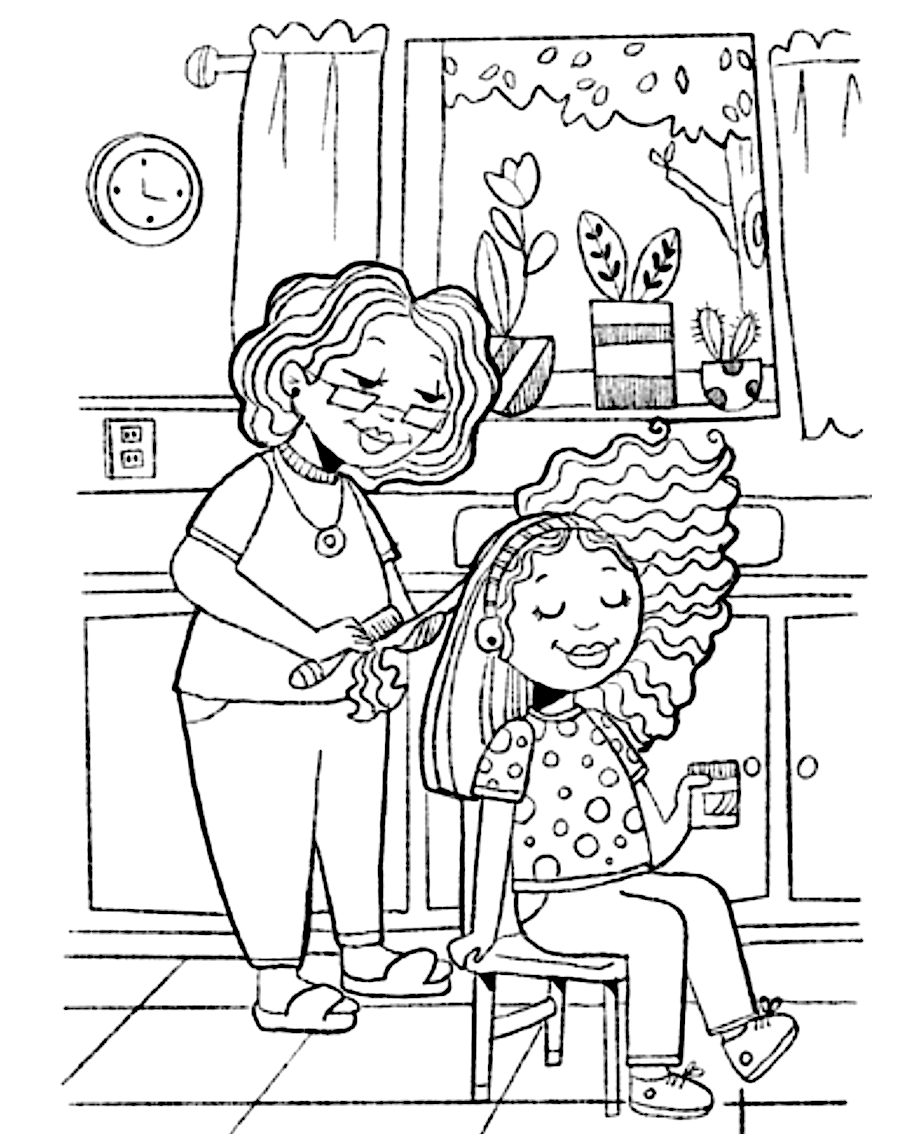Ways To Make Sunshine is the latest children’s book from New York Times-bestselling and multi-award-winning author Renée Watson, a magical heart-warming book for your pre-teen youngster.

Reneè Watson has a real gift for storytelling, as evidenced by the awards she has won for her novels, which include Piecing Me Together, What Momma Left Me and Watch Us Rise, co-written with Ellen Hagan.
In this, her latest work, she creates the start of a character-driven, young middle grade series starring a Black girl and her relatable and lovable family.
Ryan Hart and her family live in Portland, Oregon. The Harts are an everyfamily – a family with siblings who bicker, parents who don’t always get it right, but a family that loves. A family working hard to make it in tough economic times, a family with traditions and culture, a family that tries new things. This is a Black family growing up in middle class America. See? Relatable.
We are privileged to share with you, a chapter entitled Afropuffs, which shares a beautifully written, very important message of loving yourself, no matter what; a reminder for you, as well as your child.

Chapter 8 – Afropuffs
Most kids my age are probably doing something really fun since it’s Saturday, but not me. I am rehearsing my Easter speech over and over in my head so that tomorrow at church, I say it perfectly. Every Easter (and Christmas, too) all us kids who attend Sunday school recite speeches in front of the whole congregation.
This is the worst part of the holiday. I hate everything about it: the way everyone stares, the way the microphone makes my voice sound weird, like I am underwater or speaking into an echo chamber, depending on who is working the sound system. I hate it because no matter how much I practice, I always forget a word and then I freeze and all the adults say that’s okay, baby (even though I am not a baby), and all the other children, especially the teenagers, laugh. And then I just run off and hug Mom and she says, “It’s okay. At least you tried.”
This is what happens every year. But not this year. This time I have read my speech so many times, I can say it in my sleep. This time I practised in the mirror. This time I recited it as Amanda read along to double-check if I was saying it right. This time I will speak so loud, I won’t even need the microphone. I will do so well; I will get a standing ovation.
This is what I am thinking about just before Grandma comes over to do my hair. She is coming to get me looking good for tomorrow because for our family, Easter is not only about speeches, it is about new spring dresses and Sunday shoes, every hair in place. It is about family dinner—devilled eggs, honey ham, mashed potatoes, mac and cheese, and collard greens. It is about wicker baskets full of chocolates and plastic eggs full of surprises.
When Grandma comes, she hugs me and Ray and then walks through the house with Mom, who is showing her every room. “It’s, um, it’s . . . nice,” Grandma says.
“Isn’t it? The size adjustment took some getting used to, but I don’t think it’s that bad. I think it’s cosy.” “Yes, cosy. That’s the word I was looking for,” Grandma says.
“Child, there is no mistaking it. You are a Black girl and you have Black hair…”
Grandma is a brown woman, tall like the sunflowers that rise in the community garden down the street. Nothing about her is small, or quiet, or timid. She goes into the kitchen and calls out to me. “Ryan, come on in here and let me fix you up.”
Grandma used to be a beautician. She owned a hair salon and made a living making women look pretty. She closed the shop last year but still does hair for special clients.
She is standing at the stove. When she turns it on, the fire blazes up and she adjusts the knob to make the fire settle to a low flicker. Grandma sets the pressing comb on the stove. The iron teeth of the comb begin to warm and just as smoke rises, I sit down in the chair in front of her.
She unbraids the thick twists Mom did after she washed my hair last night. Now my hair is dry and ready to be straightened. Most times I wear my hair in a big puffy ponytail.
Sometimes Mom does two-strand twists and my hair hangs like the black yarn she uses when she sews dollies for her Saturday Market booth. I only get my hair straightened for special occasions. Grandma begins pressing my hair. “Child, there is no mistaking it. You are a Black girl and you have Black hair,” Grandma says. She says this every time she presses my hair. “It is so thick. Just like your momma’s.”
She pulls the comb through my kinky yarn and like magic, I feel the silky strands fall to my shoulders. “Weatherman says there’s a chance of morning showers. But then clear and dry for the rest of the day. You know if it gets wet it will puff right back out and all this time spent straightening it will be a waste.”
“Yes, ma’am,” I say. Pressing hair takes a long time. I have to sit and sit and be very, very still, and hold my ear down so Grandma doesn’t burn me as she straightens my edges. It takes forever, but I love the way it looks once it is all finished.
“You know, I used to do your momma’s hair like this until she went natural,” Grandma tells me. She pulls the pressing comb through my hair, then rests it on a towel sitting on the counter.

I can feel that one side of my hair is all straight and lying flat while the other side is still crinkled and all over my head. Ray walks into the kitchen and opens the refrigerator. “You look weird with your hair like that,” Ray says. He pours cranberry juice into a cup and gulps it down.
“You look weird no matter how your hair looks,” I tell him.
Mom calls out to us from the living room. “All right, you two. Don’t start.” She is sitting on the sofa knitting something to sell at Saturday Market. Next week the market starts back up, so she’s been getting ready. Dad is resting before he has to go to work.
When Grandma is finished with my hair, we go to the bathroom together. I stand in front of the vanity and she holds up a mirror behind me so I can see how I look. “I love it,” I tell her. “I look beautiful.”
“Well, Ryan,” Grandma says, “you are beautiful. No matter if your hair is straight or not.”
“Yeah, but I am more beautiful with my hair like this,” I say. I run my fingers through my hair, feel them slip through every black strand. Instead of fuzzy yarn, it feels like silk.
“Your kindness makes you beautiful and the way you’re always willing to offer help makes you beautiful.”
Grandma turns me around to face her. “Baby girl, you are beautiful. Not just your hair or your clothes. But who you are. Your kindness makes you beautiful and the way you’re always willing to offer help makes you beautiful,” Grandma tells me. “And how creative you are with your recipes. That’s what makes you a beautiful girl.”
Grandma turns me back to face the mirror. We both look into the glass, staring at my brown skin, my round face, my long straight hair. “How you wear your hair is your choice and no matter what you choose, it’s not going to determine if you’re beautiful or not. The only thing that will determine that is how you treat others. If you are mean to people, if you act ugly towards them, that’s what takes your beauty away.”
Grandma kisses me on my forehead and then says, “Now let’s get you ready for bed.”
I put on my pyjamas and my hair bonnet. Before I get into bed, I practice my speech one more time. I fall asleep holding on to Grandma’s words.
Ways To Make Sunshine published by Bloomsbury Children’s Books
Text copyright © Renée Watson, 2020
Illustrations copyright © Mechal Roe, 2020
Buy Ways To Make Sunshine here












